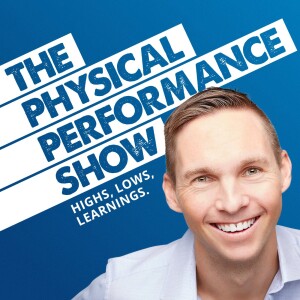
254: Tapering for Endurance Athletes'. Inigo Mujika (PhD) Sports Physiologist, Researcher, & Author.
 2021-01-26
2021-01-26
By way of bio, Inigo is an avid researcher, sports science practitioner and a coach applying his academic learnings. Since 1992 Indigo has been devoted to the research of tapering and peaking for sports performance. He's published many peer reviewed scientific articles, many book chapters and five books. As a sports physiologist, Inigo works closely with elite athletes and coaches in a variety of individual and team sports. Inigo currently serves as a Head of Sports Science for Spanish Aquatics and has previously served roles with the Australian Institute of Sport from 2003 to 2004. In 2005, Inigo worked as a physiologist and trainer of the professional road bicycle Racing Team Euskaltel Euskadi, he's also coached world class triathletes including Olympians so you get a sense for Inigo’s pedigree and expertise on this topic of tapering.
Now what can you expect from today's episode? Well, we've all tried to either conduct our own tapers or have had tapers programmed for us from coaches and we all know that sometimes they go well, sometimes they don't. So through today's learnings, you'll be able to extract the scientific body of work the evidence based best practices, when it comes to tapering. Inigo will share the definition of tapering and peaking, outline the main aim of tapering, share why if a taper goes well you can expect up to a 3% improvement between pre and post taper performances. Inigo outlines the three variables that can be manipulated with a taper, training intensity, training volume and training frequency. Inigo shares from a 2011 landmark scientific review, the best practices when it comes to Endurance Sports tapers in terms of length, what to do with reducing volume and what not to do when it comes to tinkering with intensity and training frequency. Inigo explores nutrition and hydration practices through a taper and outlines why it is key to arrive at your racing body mass at the start of the taper, rather than at the end.
Finally, Inigo outlines what actually occurs when we taper in terms of physiological effects and then what occurs at the end of a season when we take a break, the de-training effects and then what we can expect with the retraining effects physiologically, as we return to training. There's the single piece of advice and of course, the physical challenge for the week.
Join the The Physical Performance Show LEARNINGS membership through weekly podcasts | Patreon
If you enjoyed this episode of The Physical Performance Show please hit SUBSCRIBE for to ensure you are one of the first to future episodes.
Jump over to POGO Physio - www.pogophysio.com.au for more details
Follow @Brad_Beer Instagram & Twitter
The Physical Performance Show: Facebook, Instagram, & Twitter (@tppshow1)
Please direct any questions, comments, and feedback to the above social media handles.
More Episodes
Create your
podcast in
minutes
- Full-featured podcast site
- Unlimited storage and bandwidth
- Comprehensive podcast stats
- Distribute to Apple Podcasts, Spotify, and more
- Make money with your podcast
It is Free
- Privacy Policy
- Cookie Policy
- Terms of Use
- Consent Preferences
- Copyright © 2015-2024 Podbean.com



